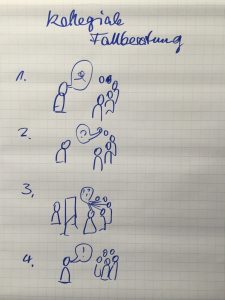As a consulting firm, we shouldn't actually explain such things, but we did!
At our 24th base camp on 23.05.2016, we presented and practiced the methodology of collegial case consultation.
This is because colleagues can also help each other with specific issues without the need for external advice.
You just need to know how to organize such a discussion effectively and under what conditions it works.
We started the evening with an input from Frank Eberhard, Senior Executive Consultant at wibas, on the 4 basic steps of collegial case consultation.
 The case owner describes his situation and formulates his key question
The case owner describes his situation and formulates his key question- The group asks the case giver comprehension questions
- The case giver withdraws, preferably with their back to the group, and listens. The group forms hypotheses, assumptions and ideas for solutions.
- The case giver comes back to the group and gives a summary of what was helpful for them.
And because learning is known to work better in a "mixed forest" than in a "monoculture", our participants have supplemented the four basic steps with their own exciting techniques and variations.
The result was a small but fine set of methods for collegial case consultation, which we then tried out straight away.
In two discussion-rich rounds, we dealt with two participants' questions using different variants of the methodology. And we were all surprised by the many good ideas and solutions that came about in just 30 minutes through this structured consultation with colleagues!
What makes collegial case consultation so helpful as a methodology?
We reflected on and answered this question together at the end of the evening.
- Structure, time frame and the formulation of the key question enable focus.
- Clearly defined speaking and listening phases enable concentration and real listening.
- The "turning away" of the case giver makes it easier for the group to think freely and express their thoughts.
- Due to the heterogeneity of the group, the key question is viewed from different perspectives and creativity is generated.
- Trust between the participants grows and strengthens the group.
- Communication and feedback skills can be developed.
Collegial coaching requires trust and openness among the participants. It was nice to see that both are present at the base camp!
We are already looking forward to the next base camp and the managers present who are interested in discussing current topics with us in a relaxed atmosphere.

Comments
Write a comment